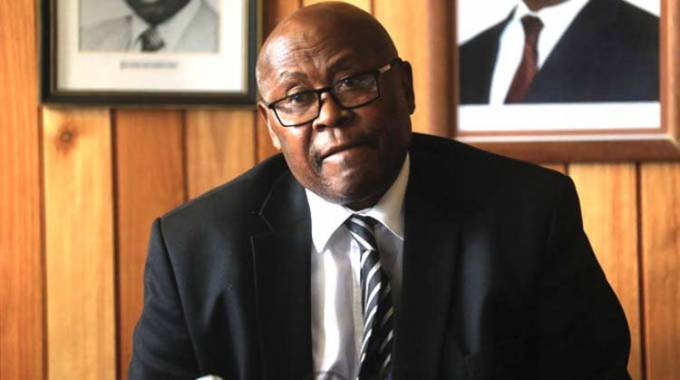
The Sunday Mail

Brian Chitemba and Harmony Agere
SCHOOLS that have unilaterally hiked fees and those charging foreign currency without approval risk deregistration, Government has warned.
Primary and Secondary Education Minister Ambassador Cain Mathema yesterday said schools should strictly adhere to current regulations.
The second term was supposed to begin this week but President Emmerson Mnangagwa indicated that conditions are not yet conducive for a safe learning environment, especially in the wake of growing coronavirus cases.
Despite being closed, most private schools are demanding upwardly reviewed fees, which have raised the ire of parents and guardians, who view them as exorbitant.
Minister Mathema said schools that intend to hike their fees should seek approval first, while those demanding foreign currency should stop the practice forthwith.
“I must warn them that I will not hesitate to deregister those out of line. We need as many schools open as possible, but regulations must be adhered to,” he said.
“Some schools even have the guts to charge in US dollars, openly, in broad daylight — we are saying that is not good. It must stop!”
Amb Mathema said the Education Act provides for the approval of any changes in school fees for both private and public institutions.
“I have seen some invoices but as Government, we don’t think this is the right time for people to be asking about money when everyone else is worried about human life.
“Having said that, I would like to emphasise that all fees increases have to be approved by the Permanent Secretary (Mrs Thabela Tumisang) and there are no such applications at the ministry yet.”
Some schools are reportedly demanding between US$800 and US$2 000. Some of the invoices seen by The Sunday Mail include St George’s College, which is demanding US$1 850 for learners enrolled for secondary school, while its primary school — Hartmann House — wants between US$930 and US$1 335 for the new term.
St John’s College is charging between US$900 and US$1 650, while Heritage School is demanding US$1 300.
Chisipite School is asking parents to stump up US$1 500 or $90 000 per term, while Dominican Convent is demanding US$800 or ZWL$22 500.
St Michael’s Preparatory School fees are pegged at US$890.
Parents complained that the fees were punitive and a “rip-off” given the current situation where business is subdued due to the national lockdown.
In their letters to parents and guardians, most schools said demand for school fees payment was justified as they will soon be transitioning to online lessons until normalcy returns.
“It is ridiculous for schools to be charging that much for online education. The question is what are the costs for all that money, say US$1 500 at Chisipite Senior School? Students are not going to school and teachers might as well be operating from their homes if they have good internet connection. This craziness must stop,” said a parent who preferred not to be named to protect his school-going children.
Another parent pleaded for Government intervention to stop the new fees frombeing effected.
She said: “Private schools have gone crazy. They are charging school fees using black market rates. Government should do something about this.”
A parent at Heritage School in Borrowdale was not amused by the new fees.
“Heritage is charging more than US$1 300 for online learning. They do not consider WIFI internet connection charges and gadgets. Charging exorbitant fees in such an environment?” he said.
Association of Trust Schools chair Mr Tim Middleton was not available to comment as he is believed to be away.
But Dominican Convent School headmistress Sister Kudzai Mutsure said they reduced the fees from US$1 000 to US$800 because “when kids are not in school, money is saved on other budget lines”.
“The major added cost is data for teachers because they need it for teaching, uploading students’ work, downloading work for marking and sending it back after,” she said.
In a letter, Watershed College reminded parents of fixed costs that still need to be paid whether the students are present or not.
Veteran educationist, Dr Caiphus Nziramasanga, said parents were expected to pay the new fees since schools have salaries and other conditions of service that need to be paid for.
“Whatever the case, they (schools) still have to pay the teachers, there is no option,” said Dr Nziramasanga.
“Teachers will do overtime when normalcy returns so that students are back on track. I understand the concern over the fees, but, look, this is an unfamiliar situation. The economic problems are not peculiar to Zimbabwe, but it is a global issue.”
Turning to online learning, Ambassador Mathema said Government was making efforts to ensure that no student was either left out or left behind.
“We understand that some schools are not equipped to run such classes. However, we have partnerships with broadcasters to conduct classes on radio, television and other broadcasting channels accessible to many.
“We are working on ensuring that the environment is safe for our children to return to school. Once we reach that stage, we will make an announcement on the opening dates.”
Dr Nziramasanga said the success of e-learning will depend on availability of internet in both schools and for students at home. He said the programme was likely to be a challenge for most rural schools where some do not have electricity, let alone internet access.
“Are the teachers skilled to do online teaching, and are the students able to access gadgets and internet?” Dr Nziramasanga queried.
“For other schools, a postal system could have been used in open-distance learning but due to the coronavirus, movement is restricted.
“Our postal system is not functioning; therefore, it is a challenge. Government is doing well to resolve these matters. We have to appreciate the efforts.”



